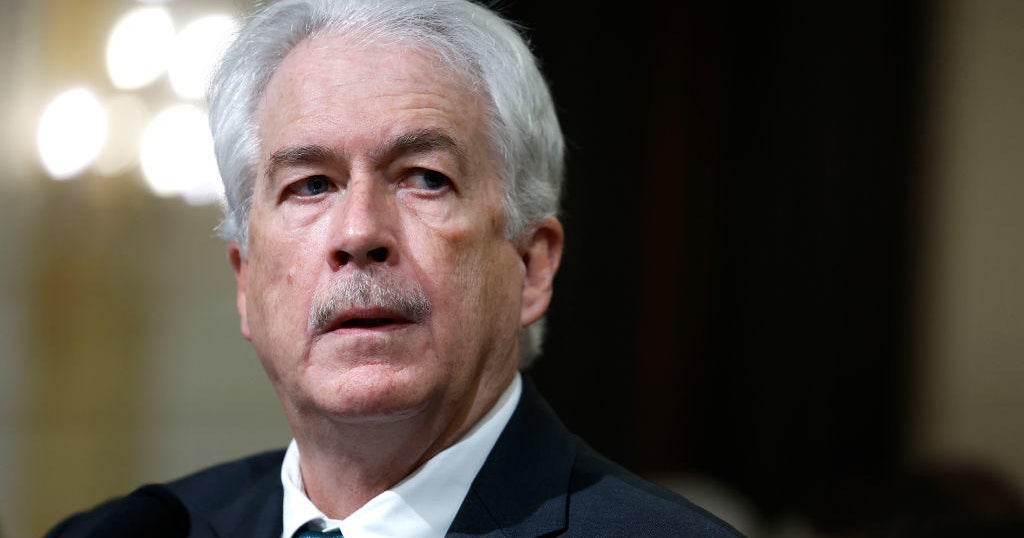CIA Director William Burns acknowledged Thursday that without U.S. military help, Ukraine could experience significant setbacks in its war with Russia.
The Ukrainians are “at a difficult moment on the battlefield right now,” Burns said during a question and answer session at the Bush Center Forum on Leadership in Dallas.
With additional U.S. help, Burns said, Ukrainian forces can “hold their own on the battlefield in 2024 and continue to wreak havoc with deeper strikes against Crimea… and against the Black Sea Fleet.”
Burns added that “with the boost that would come from military aid, both practically and psychologically… the Ukrainians are fully capable of holding their own until 2024 and breaking through Putin’s arrogant view that time is on his side.”
His comments come as one deadlocked congress aid to Ukraine continues to stagnate. House Speaker Mike Johnson spoke on Wednesday unveiled three bills to provide military aid to Ukraine, Israel and Taiwanincluding $60.4 billion for Ukraine.
“Without additional help, the picture is a lot bleaker,” Burns said. “I think there is a very real risk that the Ukrainians could lose on the battlefield in late 2024, or at least put Putin in a position where he could essentially dictate the terms of a political settlement.”
Burns Thursday also discussed the Middle East, China and other pressing national security topics. He hinted at far-reaching consequences of the war in Ukraine, including in the Indo-Pacific. Although Western solidarity in the face of Russian aggression was initially sobering to Chinese President Xi Jinping as he considered taking action against Taiwan, Burns said: “The surest way to reverse that impact is to give the impression that we are running away of Ukrainians right now.”
On the Middle East, Burns said that in his four decades in public service, he had “seldom seen a moment as combustible as this.”
He called Iran’s direct attack on Israel last Saturday was a “spectacular failure” because of its integrated air defense, good intelligence, Israel’s military prowess and help from the US and regional partners.
Burns’ comments came hours before multiple sources confirmed to CBS News Israel launched a rocket attack early Friday morning over Iran.
He said the “broad hope” of President Biden and his administration was “that we will all find a way to de-escalate this situation, especially at a time when … the Israelis have so clearly demonstrated their superiority.”
Burns acknowledged his personal involvement over the past six months in talks on a ceasefire and the release of hostages in the United States Israel-Hamas war.
U.S. officials have pushed for a six-week ceasefire that would allow for a phased release of hostages and a related release of Palestinian prisoners from Israeli prisons. Israeli officials said around 240 people were reportedly taken hostage during Hamas’ terrorist attack on October 7. Six months laterless than half of the prisoners have returned.
Burns noted that he has met with hostage families and that striking a deal “has proven to be very difficult.”
“It’s a big rock to push up a very steep hill now,” he said, adding that it was a “deep disappointment” to receive a negative response from Hamas to the latest proposal.
“I can’t honestly say I’m confident we’ll succeed, but it won’t be for lack of trying,” Burns said. “And I know the alternatives are worse.”
He said U.S. competition with China was broad and covered many areas, including space, technology and cybersecurity.
Spoken on Wednesday to steelworkers in Pittsburgh, Mr. Biden said he would urge U.S. Trade Representative Katherine Tai to triple China’s steel and aluminum tariffs from their current rate of 7.5%.
Burns said he believed Xi was “determined to control Taiwan over the course of his political life.”
“[That] That doesn’t mean he plans to invade tomorrow, next month or next year, but it does mean we have to take that ambition very seriously,” he said.
Burns warned that China and Russia are “working more closely together now than at any time in my memory,” adding that the deepening partnership was a “key challenge” for the US.
The phenomenon of transnational repression by autocratic countries such as Russia, China and Iran seeking to “kill or intimidate” activists outside their own borders was a significant problem, he said.
“It’s a growing challenge and one that we as an intelligence agency take very seriously,” Burns said.
Burns also discussed the challenges of technological advancements, including ubiquitous surveillance, as well as the benefits of strategic intelligence declassification. He spoke of the ‘duty to warn’ which obliges the intelligence services to warn when civilian lives are at stake. recent terrorist attacks in Russia and Iran.
“We, the U.S. government, provided the Russian services with some pretty accurate information about what we could see as an impending terrorist attack by ISIS on, you know, a pretty big entertainment center in Moscow. And you know, you’d have to ask the Russian services… why they didn’t pay more attention to that, why they didn’t act on it.”





